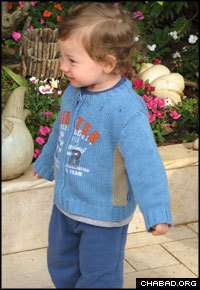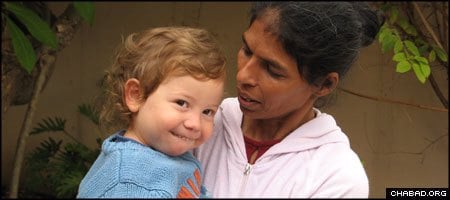Family members of the six victims recovered from the Chabad-Lubavitch center in Mumbai, India, concluded Judaism’s traditional seven-day mourning period on Tuesday. In the northern Israel town of Afula, Rabbi Shimon and Yehudit Rosenberg were set to be reunited with their orphaned grandson Moshe, whose parents – Rabbi Gavriel and Rivka Holtzberg – directed the Chabad House where Islamist terrorists held out for three days before Indian security forces launched a final operation to retake the center. Due to the crush of mourners at all hours of the day at the Rosenbergs’ home, they preferred to keep Moshe at another family member’s house ten minutes away with Sandra Samuel, the nanny who heroically saved him from the Chabad House.

On Monday, young Moshe’s demeanor seemed for a moment as distant from the attacks as his physical presence in the Migdal Haemek, Israel, home of his great-uncle, Rabbi Yitzchak Dovid Grossman. Held tight in the arms of Samuel, the boy pointed at various items in the house’s garden before being let down to explore for himself. With a smile extending from ear to ear, he toddled over to a figurine of an elephant and looked up to Samuel for approval. The only hint of discomfort came when the nanny would turn for a second to talk to a visitor: With an expression turning to worry, Moshe would cry, “Sandra! Sandra!”
Such has been the last week for a boy who every so often will call out in Hebrew for his mother and father. Things are certainly improving, said Grossman and Samuel, and now Moshe is able to sleep through the night. He still gets scared around strangers, though.
In Israel, “he has everything he needs,” said Samuel, 44, sitting down for an interview while Moshe watched his favorite DVD with his great-aunt, “his booba, his mooma, his moomee. He has a garden and swing. He can’t [really] talk, but during some things, like playing chubby cheeks or patty-cake, he calls out ima or abba.”
It’ll be a long road ahead, admitted the nanny, who has indicated her willingness to stay in Israel as long as it takes.
“I’m here as long as the baby needs me,” she said. “I’ve been told not to worry about” passports and visas.
For the time being, Samuel and Moshe will live with his maternal grandparents, whose modest home in Afula was swamped with thousands of people coming to offer their condolences over the past week. Shimon Rosenberg and three of his sons welcomed visitors from a temporary tent erected in their backyard. Wearing a jacket ritually ripped at the Holtzbergs’ funeral in Kfar Chabad and sitting on a low couch made of mattresses, the rabbi urged people to translate their feelings of pain into a commitment to do good deeds and be better people.
Outside the tent, a stand beckoned Jewish men to put on tefillin. Trays of food were set up inside the house.
Back in Migdal Haemek, Samuel said she still hasn’t come to terms with the death of her employers, who became like family members to her. When her husband died two years ago, it was the Holtzbergs who covered the 20,000 rupee cost of the funeral.
“Even now, it’s not going through my mind that they’re no more,” said the woman. “If I had known something would happen, I would have tried to get them out as well. It’s all so senseless.”








Join the Discussion